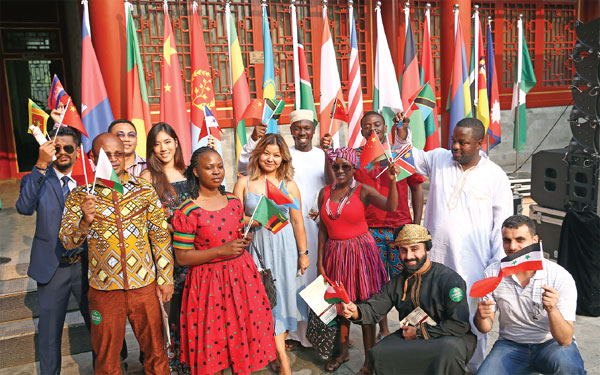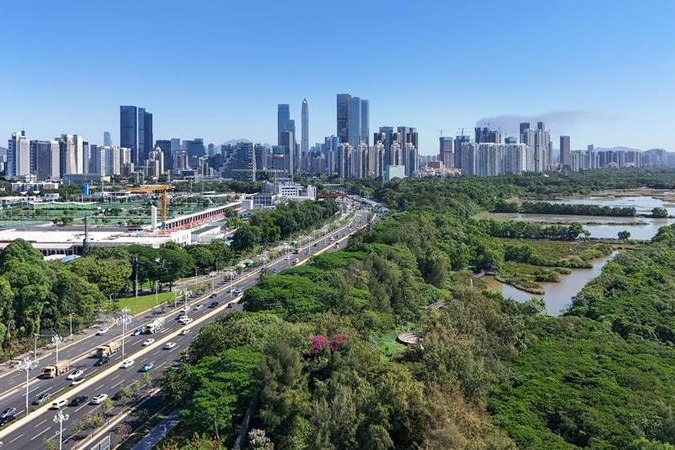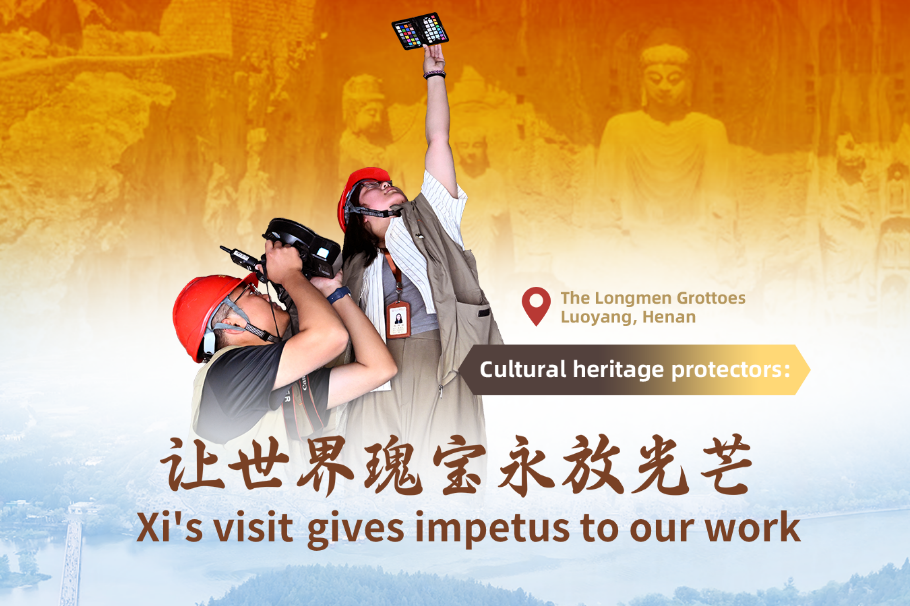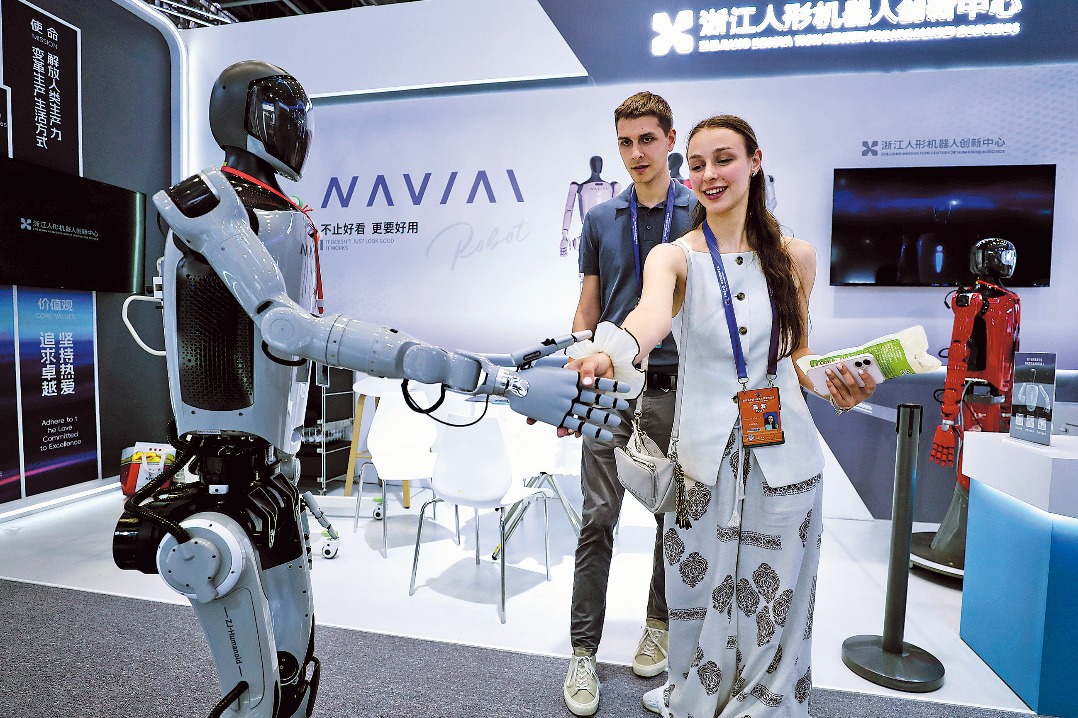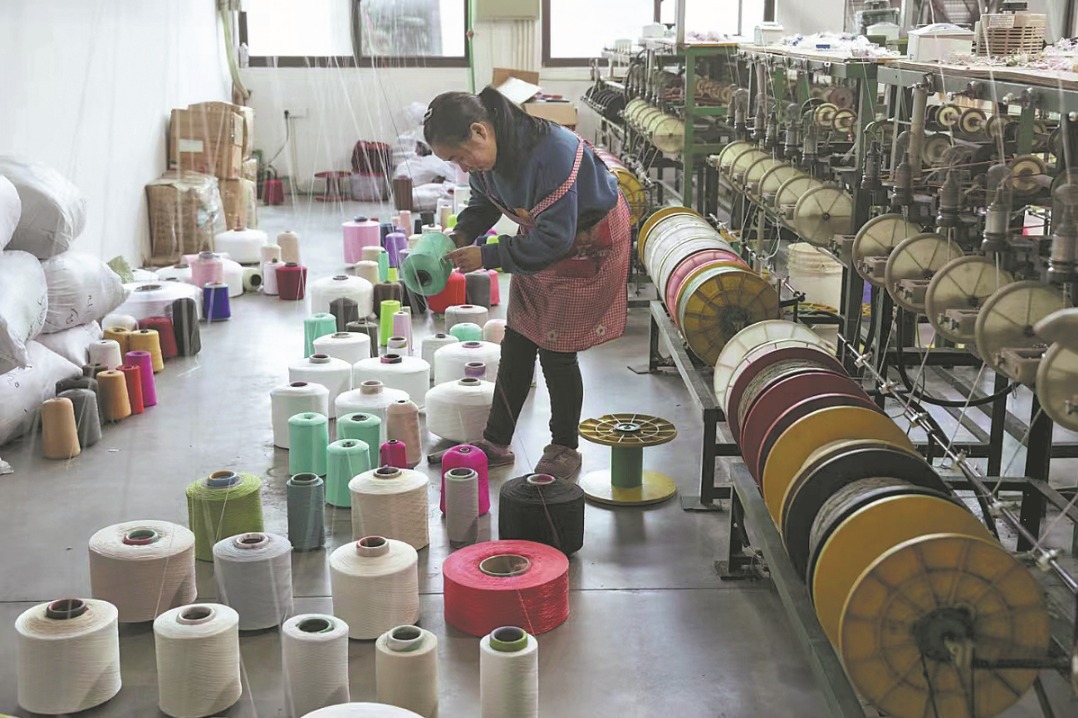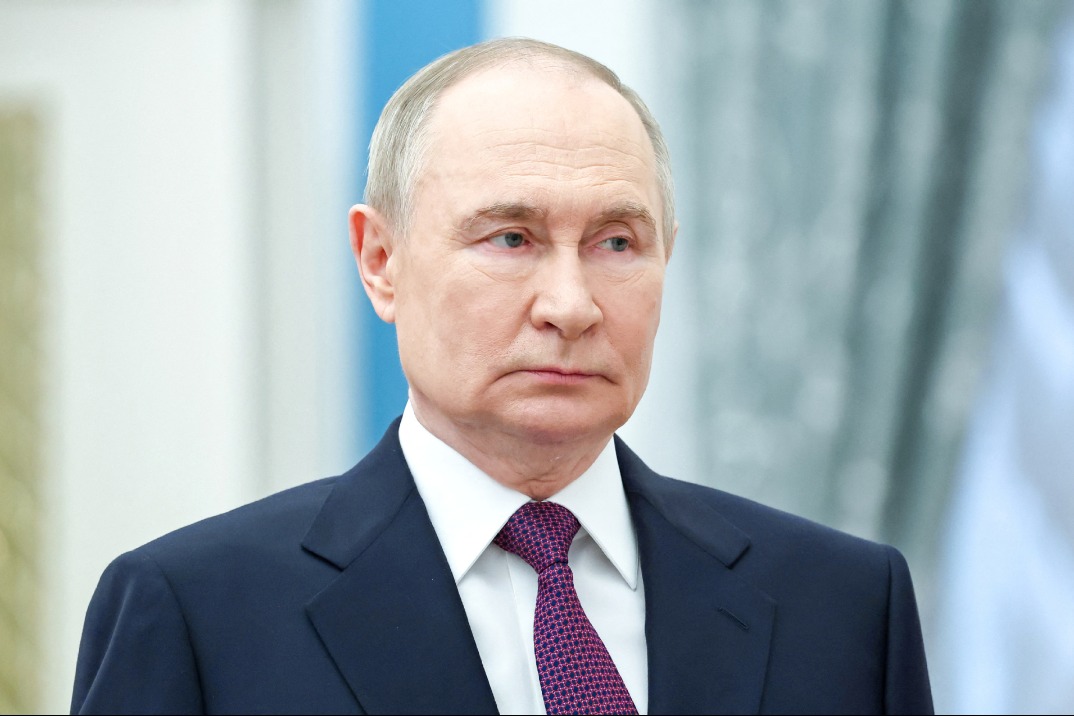Growth lessons

Peking University institute helps promising leaders from developing countries understand and analyze China's development experience
In a September 2015 speech at United Nations headquarters in New York, President Xi Jinping announced a series of programs that China would make available to other developing countries, including projects in poverty reduction, agricultural cooperation, trade promotion, environmental protection, health and education. In addition, during the speech to the High-Level Roundtable on South-South Cooperation, he announced the creation of a venue for the international study of economic development.
"China will also set up an academy of South-South cooperation and development," Xi said.

Yao Yang, a professor of economics at the National School of Development of Peking University, says his school was honored to jump into action after Xi's speech. The Institute for South-South Cooperation and Development, an English-language graduate school at the university, was established to give promising leaders from developing countries the opportunity to learn about, and analyze in depth, China's economic development experience.
Yao, who is now executive dean of the institute, says the school will concentrate on economic development, in contrast with Western organizations, such as Harvard University's Kennedy School of Government, that focus on international relations and government management. "We are going to focus on economic development, so economists are the backbone of our faculty. I think that is more pertinent for developing countries, where raising incomes is the most pressing issue."
Fu Jun, the institute's academic dean, emphasizes that developing countries are important to China's economic future. "To link different parts of the world together, you need to have connections at the physical dimensions, at the economic institution dimension, and also at the dimension of ideas. This program is at the dimension of ideas, the exchange of ideas, and people-to-people contact. That is what we are doing here," he says.
The great debate
Fu kicked off the Institute for South-South Cooperation and Development's second year with a discussion of a key issue that permeates the curriculum: How do you find the correct balance between the state and the market?
He starts from first principles: "Why do we need to have a state? When you read Adam Smith's The Wealth of Nations, there are hundreds of pages in that book on the role of the state. Serious economists argue that the market is efficient. They never claim that it is perfect. So the implicit message is that markets themselves cannot work without institutions. Where do we draw the line between the market and the state?"
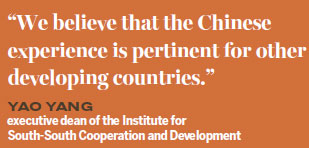
Yao argues that the institute offers a unique opportunity for students to analyze China's development model. "Our faculty has a unique combination of knowledge. All are trained in the US or other countries. In the meantime, we know China well. We have studied China for our lifetime, so we have a good combination. We believe that the Chinese experience is pertinent for other developing countries. But don't take me wrong. We don't want students to copy the Chinese experience.
"I teach a course in the political economy of economic development in China. The first thing I tell them is that I'm going to talk about China. I have no knowledge about your countries. You are going to see China as a mirror of your own country, and you are going to decide which part of the Chinese experience is useful for your own country," Yao says.
This echoes President Xi's comments at the South-South Roundtable, when the president said: "The first (proposal) is to explore diversified paths of development. A matching key is required to open the lock. The developing countries should stick to the development paths of their independent choice and with their unique characteristics, share successful experience in governance and administration of state affairs, focus on capacity-building, explore growth potential, solve development difficulties and improve the well-being of the people."
Yao emphasizes the quality of debates at the school: "We have a spectrum of faculty from the ultra-right to the ultra-left. We have professors at each point. Most of the professors work on economics, which does not have any ideological implications. Students can listen to all sorts of voices and opinions - that is their choice, whether they are going to choose market-oriented or government-oriented policies."
The institute's curriculum covers four cross-cutting policy domains - development and poverty reduction; innovation and education; population and health; and climate change and the environment. Courses on leadership aim to give the students intellectual leadership skills and the managerial skills needed to run public organizations. A course in microeconomics is required so each student will be able to analyze incentive structures. Courses in macroeconomics and the role of the state are also required, giving students the tools needed to assess the right balance between the state and the market.
On top of this, students conduct field studies in rural areas, special economic zones, coastal cities and interior parts of China. For example, they visit Xiaogang village in Anhui province, where a group of villagers started China's reforms by secretly agreeing to divide their collective farm into private plots. The students are asked to analyze the risks and incentives faced by the villagers.
World voices
The Institute for South-South Cooperation and Development's students come from 23 developing countries in Africa, Latin America, Asia and Europe. They all work in the public sector or nonprofits. Many are idealistic, dreaming of changing their countries with the knowledge learned in China.
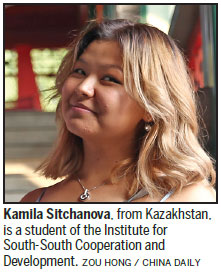
Several students plan to tie their experiences at the institute with future work related to the Belt and Road Initiative or the Asian Infrastructure Investment Bank.
Nasser Alsahqsi, from Oman, says: "We in the Middle East are depending on oil and gas, but they will vanish someday. What I want to take back is how China survived without what we have in terms of raw materials. I really want to reform the backward philosophy of my country. We need to open up for foreign direct investments. We are opening up some now, but it's more like we are afraid to take that step. Chinese companies are opening up some industrial zones back in my country. This fits into what they are planning now in the Belt and Road Initiative. From the sea, shipments come directly to Oman, and that is very good for Oman."
Yousaf Malik was sent to the institute by his employer, the secretariat for the China-Pakistan Economic Corridor in the Pakistan Ministry of Planning and Industrial Reform. His agency is responsible for dealing with China's National Development and Reform Commission and with Chinese companies that invest in Pakistan. He says that Chinese loans to his country are effective because they give the money in progress payments directly to the company that wins the tender. "The IMF gives money to the government directly, and much of it goes into corruption.
"IMF projects tend to go on and on and on," he adds, "but the Chinese projects are held to a deadline. We have a free hand to choose our own projects with Chinese money, but not with the IMF."
Kamila Sitchanova, from Kazakhstan, says that in 2015 her country adopted a strategy similar to the Belt and Road Initiative. She works in the international cooperation division of the State Revenue Committee and focuses on cooperation between Kazakh and Chinese customs. China is sponsoring her department's efforts to set up automatic checkpoints along all of her country's borders.
Thandanani Wah Ziqubu, a 27-year-old from South Africa, has worked for the Department of Economic Development, Tourism and Environmental Affairs and is a member of the Communist Party of South Africa. He has had trouble finding jobs because South Africa's unemployment rate now stands at 27.7 percent and is much worse among the young.
"I think it all comes to making the people understand that you are the master of your own destiny. You cannot rely on the government to do things. That is the way it is in China. In South Africa, we are moving toward being a developmental state, and that can't happen unless the people are conscious that they can do whatever in this country, just as long as it's within the law. And you can do whatever economic activity as long as it is going to bring about positive economic change to the country. In China, the Communist Party gives the people more room to be actors because it is one with the people," he says.
He also emphasizes the opportunities for all to contribute in China. "The culture and the education they receive promote that culture of working and of participation from each and every person. From the time you are 14 years old, you are able to work and contribute to the economy. The economy of China is so great and South Africa can be like that. The culture of a working people is instilled in the people. In the next 50 years, we can also see ourselves in a very, very favorable position within the global economy.
"To me, economics is the most valuable part of our curriculum. You are looking at the world, but from the Chinese perspective. It's not like you are looking at something that has never been tried. They are doing it now and we are seeing the results. It is better to learn from something that will work than doing something you know has hurt a lot of people - that has made a few people rich," he says.
Ordeal Mwedziwachena, a high school history teacher from Zimbabwe, says: "I came here definitely to improve my intellectual mindset and to shift the way we see things. I want to learn analytical approaches to life and development, especially when it comes to designing, implementing and supervising policy. We need to eradicate the corruption that is eroding the government's efforts toward development. So, we have to move from where we are. With this kind of experience and knowledge, I think and do hope we can reach a higher stage. Though it is gradual, we will get somewhere."
Solphi Joli Hamelo, from Madagascar, has a PhD in engineering and worked in the Ministry of Water, Energy and Natural Resources. He, too, is worried by corruption and the "natural resources curse". He jokes that most countries in Africa have green in their flag, indicating that they are rich in natural resources. "But green in the flag is also an indicator of high corruption levels. I don't need to get another PhD, but I came here to learn economics. We need the best knowledge of China - how it works in practice - and apply it to our country."
Nipuna Thibbutumunuwa, from Sri Lanka, is a member of the Communist Party. He says: "Since 1953, the Chinese and Sri Lankan governments have had very close relationships, such as free trade agreements, investments (and) student exchange programs. In addition, Sri Lanka is really very thankful to the Chinese government for its unwavering foreign policy. The Chinese government always backed Sri Lanka in national problems but never interfered in these matters.
"During the recently ended civil war, which stretched for nearly 26 years, China backed Sri Lanka a lot - not only by providing humanitarian aid, but also by providing military training, providing us with the latest technologies and helping us at the UN Security Council. Sri Lanka was about to be put under sanctions for not stopping the war and for not giving a part of our land to the Tamil Tigers. At that point, China and Russia were the only two countries who stood with us. We are really very grateful for that. Even after the war, as you can see, there's massive development happening in Sri Lanka. China came forward and lent a helping hand by investing in Sri Lanka in all sectors such as infrastructure, health, transportation and so forth."
Simon Tor Bebe, from the Pacific island country of Vanuatu, says: "I really want to get to know the role of the state in economic issues. In a lot of ways, we are facing the same issues. I really want to know how China became strong."
Edwin Mollel, an economist who works on policy and planning at Tanzania's Foreign Ministry, says: "China shares the same path as my country. They started from a humble background and have made a tremendous achievement. I would like to learn the lessons on exactly what they did to get where they are. We can copy the leadership style that focuses on knowing where you want to go and carefully planning how to get there gradually - the commitment of the leaders to lift citizens out of poverty - embracing technology and being at the forefront.
"Why can't Tanzania do that? We have the brains. All we need is the capacity and the leaders behind us. They were almost at the same level as us, and they managed to get there," he says.
Fu, the academic dean, concludes: "We are proud to say that if you are interested in the 40 years of reforms and opening up in China, it is probably the best course in the world now. It is very focused, very intensive. It includes a lot of public policy management skills. So, the idea is to elevate not only intellectual clarity but also managerial skills. We understand that whatever policy a country designs has to have intellectual insight and a level of sensitivity to the local conditions."
davidblair@chinadaily.com.cn
| Students of the Institute for South-South Cooperation and Development come from 23 developing countries in Africa, Latin America, Asia and Europe. Photos by Zou Hong / China Daily |
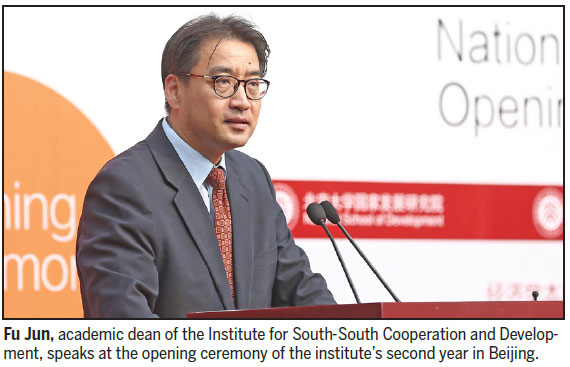
(China Daily Africa Weekly 10/06/2017 page1)
Today's Top News
- Ukraine crisis a lesson for the West
- Autonomous networks driving the progress of telecom sector
- China launches cargo drone able to haul up to 1.2 tons
- Key role of Sino-German ties stressed
- Tariffs hurt global trade: Experts
- Rescuers race against time to find survivors
















